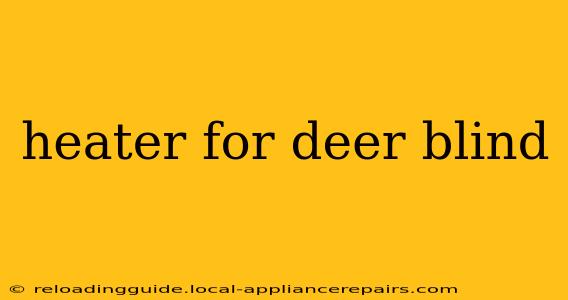Hunting from a deer blind can be incredibly rewarding, but the cold can quickly turn a thrilling experience into a miserable one. Staying warm and comfortable is crucial for maintaining focus and alertness, ultimately increasing your chances of a successful hunt. This guide explores various heater options for your deer blind, helping you choose the safest and most effective solution to keep you toasty throughout the hunting season.
Factors to Consider When Choosing a Deer Blind Heater
Before diving into specific heater types, consider these crucial factors:
- Size of your blind: Larger blinds require more powerful heaters. A small, one-person blind needs far less heating capacity than a larger, multi-person setup.
- Fuel type: Propane, kerosene, and battery-powered electric heaters each offer advantages and disadvantages regarding safety, portability, and cost.
- Safety: Carbon monoxide (CO) poisoning is a significant risk with unvented heaters. Prioritize safety features like oxygen depletion sensors and proper ventilation.
- Portability: Will you need to carry the heater to your blind? Consider the weight and size of the unit.
- Quiet operation: Loud heaters can scare away game. Look for models with quiet operation.
- Ease of use: Choose a heater that is simple to set up, operate, and maintain.
Types of Deer Blind Heaters: Pros & Cons
Let's explore the most popular heater types for deer blinds:
1. Propane Heaters
- Pros: Powerful, relatively inexpensive to operate, and readily available. Many models offer adjustable heat settings.
- Cons: Produce carbon monoxide, requiring excellent ventilation. Propane tanks can be bulky and require safe storage and handling. They are not environmentally friendly.
- Safety Note: Always use propane heaters in well-ventilated blinds and consider using a carbon monoxide detector.
2. Kerosene Heaters
- Pros: Similar heating power to propane heaters, relatively inexpensive to run.
- Cons: Produce carbon monoxide, requiring excellent ventilation. Kerosene can be messy to handle and has a strong odor. They are also not environmentally friendly.
- Safety Note: Always use kerosene heaters in well-ventilated blinds and consider using a carbon monoxide detector. Never refuel a kerosene heater while it is running.
3. Electric Heaters (Battery-Powered or Portable Generator)
- Pros: No carbon monoxide emissions, relatively quiet operation. Battery-powered options are very portable, while those running off a generator provide a more powerful heating solution.
- Cons: Battery-powered options may have limited run time, and finding a reliable power source in a remote location can be challenging. Electric heaters can be more expensive to operate than propane or kerosene depending on the power source.
- Important Note: If using a generator, ensure it's placed far enough away from your blind to avoid attracting animals with the noise and to minimize the risk of carbon monoxide entering your blind.
4. Catalytic Heaters
- Pros: These heaters burn fuel more completely than traditional propane or kerosene heaters, producing significantly less carbon monoxide.
- Cons: Often more expensive than traditional heaters. They can be less efficient at heating larger blinds.
Choosing the Right Heater for Your Needs
The best heater for your deer blind depends on your specific needs and priorities. If portability and safety are paramount, a battery-powered electric heater may be the best option. For larger blinds or situations where prolonged heat is necessary, a well-ventilated propane or catalytic heater might be a better choice. However, always prioritize safety by ensuring adequate ventilation and considering a carbon monoxide detector.
Safety First: Essential Tips for Using Heaters in Deer Blinds
- Ventilation: Adequate ventilation is crucial to prevent carbon monoxide buildup, regardless of the heater type. Ensure your blind has sufficient openings for air circulation.
- Carbon Monoxide Detector: Invest in a battery-powered carbon monoxide detector for added safety. Check the batteries regularly.
- Proper Fuel Handling: Always follow the manufacturer's instructions for handling and storing fuel.
- Regular Maintenance: Regularly inspect and maintain your heater according to the manufacturer's recommendations.
- Never Leave Unattended: Never leave a heater unattended while in operation.
By carefully considering these factors and prioritizing safety, you can select the perfect heater to keep you warm and comfortable during your next hunting trip, increasing your enjoyment and success. Remember, a warm hunter is a happy, and more importantly, a safer hunter.

